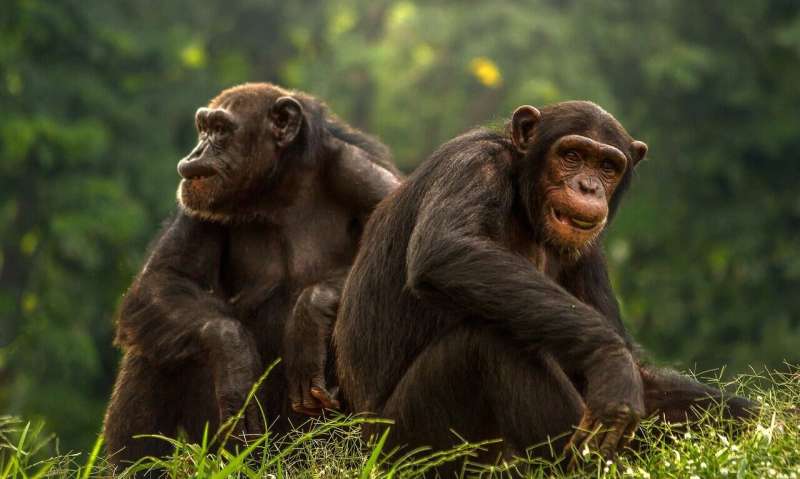Don't interrupt: Bonobos are sensitive to joint commitments in social interactions

Bonobos, when abruptly interrupted in a social activity with another bonobo, resume it as soon as the interruption is over with the same partner. This ability—the feeling of mutual obligation when interacting—has previously been assumed to be unique to humans. However, a study conducted at the University of Neuchâtel has just demonstrated its existence for the first time in the natural interactions of bonobos. It is published today in the journal Science Advances.
In humans, joint commitment is the sense of mutual obligation we feel toward each other when we do things together, such as sharing a meal. But if one person is interrupted in this activity, by the ringing of a phone, for example, they will not just walk away, but will apologize. Then, when the phone call is over, the two partners in the interrupted interaction resume their discussion where they left off.
In bonobos, joint commitment is verified through a social interaction that is widespread among nonhuman primates: grooming. Experiments involved observing a group of bonobos engaged in such activities and then emitting either a loud sound of the holding doors to disperse the group (untargeted stimulus) or calling only one bonobo by name (targeted stimulus).
"We found that after a few minutes of interruption due to the interruption stimulus, the bonobos resumed the social activity they had started with the same partner," says Raphaela Heesen, a researcher at Durham University, U.K., and first author of the study resulting from her doctoral work at the University of Neuchâtel. "They also produce communication signals to suspend and resume interaction. "
Communication efforts vary according to the difference in rank and friendship between the partners, just as in humans. "If you're in a meeting with your boss and your phone rings, you'll apologize more than if you're doing something with your sister," she says. "Our results suggest that bonobos have at least some kind of awareness of the social consequences of interrupting a joint commitment." The study took place at a zoological park called La Vallée des Singes in Romagne (Poitou-Charente, France), where the primates can move freely outside in large, forested enclosures.
Three of the co-signatories of the study working at the University of Neuchatel, namely Klaus Zuberbühler, Adrian Bangerter and Emilie Genty, are members of the NCCR evolving language, a national research centre which has just started and in which the scientists of the UniNE are interested in the biological origins of language, including the first signs of communication observed in non-human primates.
More information: Bonobos engage in joint commitment. Science Advances. 18 Dec 2020, DOI: 10.1126/sciadv.abd1306 , advances.sciencemag.org/content/6/51/eabd1306
Journal information: Science Advances
Provided by Université de Neuchâtel



















